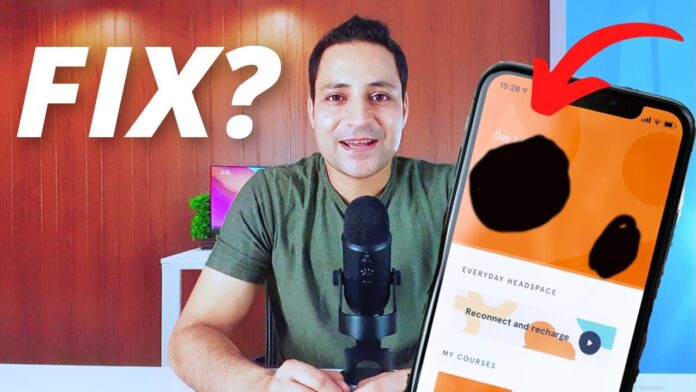To fix black spots on a phone screen, often a soft reset or display panel pressure adjustment is needed. Professional repair or screen replacement may be necessary for persistent issues.
Dealing with black spots on your phone screen can be both annoying and disruptive, but it’s a common issue many smartphone owners encounter. These unsightly blemishes, typically resulting from pixel damage or pressure on the screen, can sometimes be remedied with simple solutions such as restarting your device or gently massaging the affected area.
For more stubborn black spots, seeking assistance from a certified technician is your best bet, as they have the tools and expertise to either repair the screen or suggest a replacement. Understanding the root of the problem is crucial, as black spots can stem from a variety of causes including physical damage, liquid intrusion, or even manufacturing defects. It’s important to tackle these screen issues promptly to avoid the risk of them spreading and potentially causing further damage to your phone’s display.

Credit: m.youtube.com
Unveiling The Mystery Of Black Spots On Phone Screens
Ever noticed a pesky black spot on your phone screen? It’s not just you. Many phone users experience this frustrating issue. These spots can appear small at first, but they often grow over time. They can interfere with your screen’s visibility and overall user experience. Let’s explore what these black spots really are, why they appear, and how you can fix them.
The Nature Of Black Spots
Black spots on phone screens can be a sign of underlying issues. Think of them as bruises on your device’s display. They occur when the phone’s liquid crystal display (LCD) is damaged. This damage can disrupt the screen’s ability to display images correctly, resulting in black or discolored areas.
Common Causes Of Screen Discoloration
Different factors contribute to screen discoloration including:
- Physical damage: Dropping your phone can cause black spots.
- Pressure: Pressing the screen too hard can damage it.
- Water damage: Moisture can seep into the screen layers.
Apart from physical problems, manufacturing defects can play a role. Some users see these spots appear without any direct cause.
Recognizing what causes these spots is vital. It helps in picking the right repair strategy. If it’s a severe issue, such as water damage, professional repair is often needed. In some instances, the spots are small and less troublesome. Here, DIY methods might work. Remember, attempting repairs on your own can void warranties or cause more damage. When in doubt, consult a professional.
Initial Steps To Address Screen Black Spots
Digital dismay strikes when black spots appear on your phone screen. These blemishes disrupt your viewing experience and can be a sign of underlying issues. Here are initial steps to address screen black spots. They can quickly be tried at home and might save a trip to the repair shop.
Turn Your Phone Off And On
It sounds simple, but often a quick reboot can remedy minor glitches. Here’s what you do:
- Press and hold the power button.
- Select ‘Turn off’ or ‘Restart’.
- Wait a few seconds.
- Turn your phone back on.
Rebooting can clear temporary issues causing the spots. If black spots linger, proceed to the next step.
Perform A Pixel-fixing Application
Sometimes, stuck pixels are the culprits. Thankfully, there are apps designed to unstick these pixels.
- Download a pixel-fixing app from your app store.
- Run the application.
- Follow the app’s instructions carefully.
- Check if the black spots disappear.
This method encourages stuck pixels to start functioning correctly again.
Caution: Always use trusted applications. Unreliable software can further harm your device.
Diy Techniques For Minor Screen Issues
Black spots on your phone screen can be annoying. Good news, there are some DIY techniques that can help fix minor screen issues. You might be able to solve the problem at home. Let’s explore some methods.
Gentle Pressure Method
Use a soft cloth and a little pressure to fix those stubborn black spots. This method requires careful handling. Follow these steps:
- Turn off your phone.
- Place a soft cloth over the screen.
- Press down gently but firmly on the affected area.
- Hold for a few seconds, then release.
- Check if the black spot has diminished.
- Repeat if necessary, but do not apply excessive force.
Be patient and gentle to avoid further damage.
Using Heat To Revive Pixels
Heat can help fix stuck pixels causing black spots. It’s a delicate process:
- Switch off your device.
- Wrap a heating pad or a hot water bag in a soft cloth.
- Gently place it on the screen for about 10-20 seconds.
- Avoid overheating the screen as it may cause more damage.
- Remove the heat source and turn on the device.
- Assess the screen for changes.
Use this method with caution. Too much heat can make things worse.
Professional Repair Or Replacement Options
Dealing with unsightly black spots on your phone screen can be annoying, but deciding on professional repair or replacement is important. You may wonder whether it’s better to fix the issue or invest in a new screen. Let’s explore what’s best for your device and wallet.
When To Seek Professional Help
Understanding the severity of screen damage is crucial. Professional help becomes necessary when:
- The touch functionality is impaired.
- Black spots continue to grow in size.
- DIY fixes have not resolved the issue.
A certified technician can assess the damage and recommend the best course.
Cost-effectiveness Of Screen Repair Vs. Replacement
Choosing between screen repair and replacement involves assessing cost and longevity.
| Repair | Replacement |
|---|---|
| More affordable for minor issues. | Costly, but like getting a new device. |
| Quick solution to extend phone life. | Best for severe or extensive damage. |
Weigh the pros and cons of both options. Consider the age and model of your phone too.
Preventive Measures To Protect Your Screen
Black spots on your phone screen can be annoying. Luckily, you can stop them before they start. Taking care of your phone’s screen might save you from these pesky black spots. Let’s dive into the best preventive measures to protect your screen.
Regular Cleaning And Maintenance
Like your room, your phone screen needs regular cleaning. Dust and dirt can cause scratches that lead to black spots. Here’s how to keep your screen looking new:
- Use a soft, lint-free cloth to wipe your screen.
- Use water or a screen cleaner for tough smudges.
- Avoid harsh chemicals which can damage the screen.
- Clean gently to avoid adding pressure which can harm the screen.
Protective Accessories To Prevent Damage
The right accessories make all the difference. They shield your phone from life’s bumps and drops. Consider these options to keep your screen safe:
| Accessory | Description | Benefit |
|---|---|---|
| Screen Protector | A thin, clear layer that sticks to your screen. | Prevents scratches and can absorb shock. |
| Phone Case | A cover that wraps around your phone. | Offers edge protection and can prevent screen contact if dropped. |
| Bumper Case | A frame that fits around the edges of your phone. | Protects the corners which are vulnerable to impacts. |
Credit: howly.com
Understanding Warranty And Insurance
Black spots on a phone screen can be a real headache. Before rushing to a repair shop, it’s wise to check the warranty and insurance options. These can often provide a cost-effective solution for fixing screen defects. Many users overlook these benefits, but with the right knowledge, one can save time and money.
Navigating Warranty Coverage For Screen Defects
Manufacturer warranties typically cover manufacturing defects. First, identify the warranty period. It’s usually one to two years after purchase. Once confirmed, review the terms. Does it include screen issues like black spots? Organize purchase proof and documents before reaching out to customer service. Follow the instructed steps carefully and ship the device if required.
Using Phone Insurance For Repairs
Phone insurance adds an extra layer of protection beyond the warranty. It often covers accidental damage, which warranties might not. To claim insurance, report the problem promptly. Ensure all necessary documentation is in order, such as:
- Insurance policy details
- Description of the screen issue
- Any required deductible payment
Credit: howly.com
Frequently Asked Questions Of How To Fix Black Spots On Phone Screen
How Do I Get Rid Of The Black Spots On My Phone Screen?
To remove black spots on your phone screen, try turning your phone off and on. If spots persist, consult a professional repair service, as these spots often indicate internal damage that requires expert attention. Avoid DIY repairs as they can worsen the issue.
What Causes Black Spot On Screen?
Black spots on screens can result from dead pixels, physical damage, or liquid intrusion. These issues may stem from manufacturing defects or accidental impacts. Regular check-ups with a technician are advised to prevent further damage.
How Do I Stop My Phone Screen From Spreading Ink?
To stop your phone screen’s ink from spreading, immediately turn off your device and avoid pressing the screen. Seek professional repair services promptly to fix the underlying issue causing the leak.
What Causes Mobile Black Spots?
Mobile black spots occur due to obstructions like buildings and hills, or distance from cell towers. Poor weather conditions and network congestion can also cause them.
Conclusion
Dealing with black spots on your phone screen can be frustrating, but there’s always a solution. We’ve shared tested methods to tackle these pesky blemishes effectively. Remember, patience and the right tools are key. If issues persist, professional help is your best bet.
Keep your screen’s health in check, and happy swiping!





